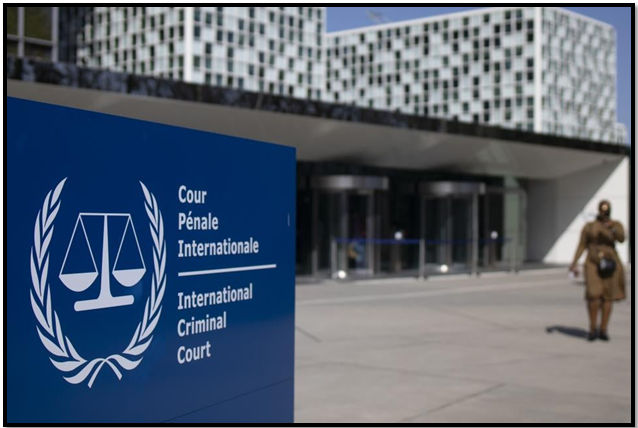ICC RESPONSE TO THE INCIDENTS FOR ISRAEL, HAMAS LEADERS FOR GAZA CRIMES
SYLLABUS:
- GS 2: Important International institutions, agencies and fora – their structure, mandate.
FOCUS:
- The Office of the Prosecutor of the International Criminal Court (ICC) has taken a welcome first step towards accountability for the war crimes committed since October 7 last year.
Source: Human Right Watch
The conflict between Israel and Hamas, particularly since the events of October 7 last year, has drawn significant international attention due to the severe humanitarian impact and allegations of war crimes. The International Criminal Court (ICC) has taken a pivotal step by seeking arrest warrants against both Israeli and Hamas leaders, aiming to ensure accountability for the atrocities committed. This move underscores the complexities of achieving justice and the challenges faced by international legal institutions.
Incident Overview
- Initial Attack by Hamas: On October 7 last year, Hamas launched a deadly attack, killing over 1,500 Israelis and taking at least 245 hostages.
- Israeli Military Response: The Israeli military retaliated with a brutal and relentless campaign in Gaza, resulting in over 35,000 deaths, most of whom were women and children.
- ICC’s Involvement: The Office of the Prosecutor of the International Criminal Court (ICC) has sought arrest warrants against both Israeli and Hamas leaders for war crimes committed since October 7.
- Implications of ICC Warrants: The application for warrants will be reviewed by a Pre-Trial Chamber of ICC judges, potentially impacting Israel more significantly due to its state status.
- International Reactions: While Israel’s staunch supporters like the U.S. may oppose the ICC’s move, many others support the balance sought by ICC Prosecutor Karim A.A. Khan in addressing crimes committed by both sides.
War Crimes and Accusations
- Charges Against Hamas: Hamas leaders, including Yahya Sinwar, Mohammed Deif, and Ismail Haniyeh, face accusations of extermination, murder, rape, torture, and taking hostages.
- Charges Against Israel: Israeli leaders, such as Prime Minister Benjamin Netanyahu and Defence Minister Yoav Gallant, are accused of war crimes and crimes against humanity, including starvation as a method of war and intentionally targeting civilians.
- Moral Equivalence Debate: Israel’s immediate concern is the perceived moral equivalence drawn by the ICC between a democratic state and an armed group seeking its destruction.
- International Legal Obligations: Member countries of the ICC are required to arrest and hand over individuals with pending warrants, potentially increasing diplomatic costs and isolating Israel.
- Historical Precedents: The ICC’s issuance of warrants against leaders like Russian President Vladimir Putin and Sudan’s President Omar al-Bashir highlights the court’s willingness to pursue justice regardless of state membership.
Impact on Israel and Hamas
- Impact on Israel: The ICC’s actions could isolate Israel internationally and complicate its diplomatic relations, especially with non-supportive countries.
- Impact on Hamas: While the non-state group might face fewer immediate consequences, the charges reinforce the international community’s condemnation of its actions.
- S.-Israeli Relations: The move may further entrench the U.S.-Israeli position on the Palestinian question, potentially affecting peace efforts.
- Diplomatic Costs: Arrest warrants carry diplomatic consequences, as seen with past ICC actions, impacting international relations and cooperation.
- Future Legal Proceedings: The ICC’s decisions will be closely watched, influencing future international legal standards and the accountability of state and non-state actors alike.
Broader Implications
- Role of the ICC: The ICC’s actions reinforce its role in seeking justice for war crimes and crimes against humanity, despite challenges in enforcement.
- Global Reactions: The international community’s response to the ICC’s warrants will reflect broader geopolitical dynamics and the balance of power.
- Accountability and Justice: The pursuit of justice for victims of war crimes remains a central tenet of the ICC’s mission, highlighting the importance of accountability.
- Impact on Peace Efforts: Legal actions by the ICC can influence ongoing and future peace negotiations, shaping the political landscape.
- Humanitarian Concerns: The high civilian death toll and humanitarian impact of the conflict underscore the need for international intervention and support.
Future Prospects
- Potential for Arrests: The likelihood of actual arrests and trials remains uncertain, but the ICC’s actions set a precedent for accountability.
- Israel’s Legal Strategy: Israel may adopt new legal and diplomatic strategies to counter the ICC’s actions and protect its leaders.
- Hamas’s Response: Hamas’s leadership will likely face increased scrutiny and pressure from the international community.
- Long-term Impact: The ICC’s pursuit of justice may have lasting effects on international law and the conduct of state and non-state actors in conflicts.
- Evolving Geopolitical Dynamics: The situation will continue to evolve, with the ICC’s actions influencing global political and legal landscapes.
The ICC’s intervention in the Israel-Hamas conflict highlights the ongoing struggle to uphold international law and human rights amidst complex geopolitical tensions. While the pursuit of justice through arrest warrants is a crucial step towards accountability, the effectiveness of such measures remains uncertain due to political and enforcement challenges. The international community must continue to support legal and diplomatic efforts to address the root causes of such conflicts and promote lasting peace.
International Criminal Court (ICC) Overview
Composition
Jurisdiction
Conditions:
|
Source: The Hindu
Mains Practice Question:
Analyze the potential diplomatic consequences for Israel following the ICC’s application for arrest warrants against its leaders. How might this affect Israel’s international relations and its stance on the Palestinian issue?
Associated Articles:
https://universalinstitutions.com/international-courts-and-climate-change/




